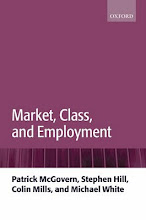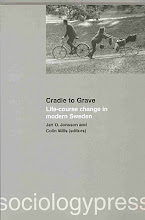Sonia Sodha has a piece in yesterday's Guardian advocating the introduction of quotas for working-class students at Oxbridge & (I think) other Russell group type universities. While the motivating sentiment is laudable the idea itself is terrible.
Firstly, what is the relevant population that we will use to determine what the quota should be? The whole of the 18-19 year old birth cohort? The 18-19 year old birth cohort that applies to university (accepting that a large proportion of working-class kids will already have selected themselves out)? The 18-19 year old birth cohort that applies to Oxbridge or the Russell Group (also self selected)?
And then who will decide who is and who is not working class? At the moment there are only 3 real alternatives all of which have disadvantages.
Firstly, self-description. HEFCE collects data on the parental occupation supplied by the applicants to HE. This data is not of spectacularly high quality, large amounts of it are missing or unusable (and not in the public domain). I would imagine that if you supplied a motive for being less than honest in the self-report its validity will not improve.
Then there is free school meals, a favourite of educational researchers. It's better than nothing, but there are a lot of working-class kids who do not have free school meals. It is also the case that to identify the really deprived you need to know about the length of time free school meals have been received (families move in and out of poverty - and in any case being poor is not the same as being working-class).
Finally there are various geographical area based measures that are often - in my opinion quite dishonestly - passed off as being measures of individual level social class. Unless the geographical areas are homogenous in their class characteristics, which is a big if, then these would allow the children of the local GP who happened to live in the deprived inner city to be classified as working-class.
OK, so we would have to up our game with regard to measurement but I guess something could be done. However I think there is actually a much more serious problem. Once you start introducing quotas there is no logical point at which you should stop.
At the moment a disproportionate number of females get into UK universities. Obviously that should stop. The disproportion is particularly large in the working-class, so actually we would need quotas for gender and class combined. But why stop there?
Though some ethnic groups are underrepresented at Oxbridge and Russell Group universities, others are not. If you condition on A level grades it turns out that in the middle of the distribution most (but not all) ethnic minority groups are considerably more likely to attend a university than the white British population. Does that mean we need quotas for white kids with mediocre grades?
In the bad old days some American Ivy League universities had quotas for Jews (to keep them out). My guess is that Jews are disproportionately represented in elite UK universities. I'd hazard a guess that the same is true of British born Chinese (but I'm less sure about this). In both cases the absolute numbers are tiny. But if we are playing the proportion game then what is the logical ground for saying that quotas should not apply?
All I can see developing is a tangled web of exceptions, special pleading and lobbying with whoever shouts loudest getting special treatment and an ever expanding set of groups to whom quotas should be applied. And once you start to go down these lines the potential for rather ugly stuff to happen becomes quite real.
Sodha starts off her piece with a story about the Norwegian men's football team agreeing to contribute some of their revenues to raise the remuneration of the women's team. I agree that this is a great advert for Nordic social solidarity values. Her point, which is not unreasonable is that redistribution creates winners and losers and in a zero-sum game the losers are inevitably those at the top. The point is that quotas for the socially underprivileged also imply quotas for the socially privileged.
But there is another, more inconvenient, point about the football analogy. As far as I'm aware neither the Norwegian men's or women's football squad have quotas to make them socially representative of the 18-35 year old population or even of the population that would like to play international football. In international football there are no arguments at the moment for contextually adjusted attainment measures. Perhaps we should seriously consider it. Anyone prepared to lobby FIFA for a handicapping system? I'd suggest making each German player wear a 10 kilo belt should even things up a bit, oh and 20 kilos for Lionel Messi.










No comments:
Post a Comment